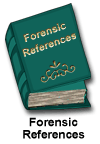|
|
 |
The
required readings for this unit are:
 Australia
Australia |
Required
Reading(s)
|
 |
Martin,
T., & Happell, B. (2001). Undergraduate nursing
students' views of mental health nursing in the forensic
environment. Australian & New Zealand Journal
of Mental Health Nursing, 10(2), 116-125. Retrieved
December 20, 2002, from Academic Search Premier database:
http://search.epnet.com/direct.asp?an=4591180&db=aph
- Note:
An evaluation of clinical placements at the Victorian
Institute of Forensic Mental Health
(VIFMH) was undertaken to determine whether appropriate
learning opportunities were offered, and identify
the impact of the placement on students' attitudes
to mental health nursing.
- "The
literature clearly demonstrates that mental health
nursing tends to be viewed negatively
by undergraduate nursing students.
While positive clinical experiences have been found
to encourage more favourable attitudes towards mental
health nursing, suitable placements
are becoming scarce. An evaluation of clinical placements
at the Victorian Institute of Forensic
Mental Health (VIFMH) was undertaken to determine
whether appropriate learning opportunities were
offered, and identify the impact of the placement
on students' attitudes to mental health nursing.
The results suggest that VIFMH provides valuable
learning experiences to increase students' understanding
of mental health nursing and is effective
in producing more positive attitudes towards this
area of practice" ( Martin & Happell, 2001,
p. 116).
|
 Canada
Canada |
Required
Reading(s)
|
 |
Insert article
here
 International
International |
Required
Reading(s)
|
 |
Sweden
Rask, M., & Aberg, I. (2002). Swedish forensic nursing
care: Nurses' professional contributions and educational
needs. Journal of Psychiatric & Mental Health
Nursing, 9(5), 531-539. Retrieved December 12, 2002,
from Academic Search Premier: http://search.epnet.com/direct.asp?an=7438493&db=aph
- Note
the findings of Nurses (registered nurses, RN, and
licensed mental nurses, LMN) working in five Swedish
forensic psychiatric units filled
in a questionnaire designed for general psychiatric
nursing, but modified for forensic
use.
- "Nurses
(registered nurses, RN, and licensed mental nurses,
LMN) working in five Swedish forensic psychiatric
units filled in a questionnaire designed for general
psychiatric nursing, but modified for forensic
use. In this report, data regarding how nursing
care could contribute to improved care and the organizational
changes needed and what knowledge the nurses need,
in order to be able to meet the demands in the future,
were analyzed by means of content analysis. The
salient findings were: (i) an interpersonal patient-nurse
relationship based on trust, empathy, respect and
responsibility for the patients' personal resources
and knowledge seems to be the essence of nursing
care and a way to improve care; and (ii) the nurses'
educational needs emanate from different treatment
modalities, how to perform different treatments,
how to establish developing relationships and in-service
training adapted to the ward-specific problems"
(Rask & Aberg, 2002).
|
 United Kingdom
United Kingdom |
Required
Reading(s)
|
 |
Adshead,
G. (1997). Career in forensic psychiatry. Student BMJ,
5, 256-267. Retrieved December 19, 2002, from Academic
Search Premier database:
http://search.epnet.com/direct.asp?an=9709303049&db=aph
- Presents
information on how to become a forensic psychiatrist,
the training necessary and details on the requirements
of the profession.
Reiss,
D., & Meux, C. (2000). Education and training
in forensic psychiatry. Journal of Forensic Psychiatry,
11(3), 501-505. Retrieved December 19, 2002, from
Academic Search Premier database: http://search.epnet.com/direct.asp?an=3998510&db=aph
- Focuses
on forensic psychiatry education and training
in Great Britain. Shortage of academic staff on
the subject; Royal Commission on Medical Education's
views on the importance of training in forensic
psychiatry for the majority of prison medical
service; Goals of higher training in forensic
psychiatry.
|
 United States
United States |
Required
Reading(s)
|
 |
Sadoff,
R. (2002). Education and training in forensic psychiatry
in the United States. Journal of Forensic Psychiatry,
12(2), 263-267. Retrieved December 19, 2002, from
Academic Search Premier database: http://search.epnet.com/direct.asp?an=5180668&db=aph
- Note:
This article explores the training and education
in forensic psychiatry in the United States. Pioneers
in the field; Establishment of the American Academy
and Psychiatry and Law; Development of accredited
fellowships in forensic psychiatry; Assessments
and evaluations in training and education.
|
Databases
For the full text article online,
sleuth the 'University
of Calgary/ Library/ Article Indexes':
Directions:
- Select
- Indexes and abstracts with links to full text articles
- Select
- Academic Search Premier or Expanded Academic ASAP
- Select
- Connect
-
Fill in
User ID and Pin
- Fill
in search words:
- forensic
and psychiatric and correctional and education
- forensic and correctional and education
Top of Page
|
 |
 |
The
'recommended only' readings for this unit are the following:
 Australia
Australia |
Recommended
Reading(s)
|
 |
Dhondea, R. (1995).
An ethnographic study of nurses in a forensic psychiatric
setting: Education and training implications. Australia
and New Zealand Journal of Mental Health Nursing, 4,
77-82.
- Note what
educational requirements were made based on the findings
of this study (Dhonda, 1995, p. 81).
 Canada
Canada |
Recommended
Reading(s)
|
 |
Insert article/book/chapter
here
 International
International |
Recommended
Reading(s)
|
 |
Kent-Wilkinson,
A., Mckeown, M., Mercer, D., McCann, G. & Mason, T.
(1999). Practitioner training, future directions, and challenges
for practice. (pp. 351-358). In Mercer, D., Mason, T., Mckeown,
M. & McCann, G. [Eds]. (1999). Forensic mental health
care: A case study approach. Churchill Livingstone, Edinburgh.
ISBN 0-443-06140-8 http://www.forensiceducation.com/forensic_files/books.htm
- Note four
brief cases of different education initiatives which exemplify
various aspects of meeting forensic training needs from
Canada and the United Kingdom. Also note this historical
overview of education.
 United Kingdom
United Kingdom |
Recommended
Reading(s)
|
 |
Insert article/book/chapter
here
 United States
United States |
Recommended
Reading(s)
|
 |
US
McKoy, Y. D. (2002, October/November). Forensic nursing:
A challenge for nursing education. Forensic Nurse
Magazine. Retrieved October 15, 2002, from
http://www.forensicnursemag.com/articles/2a1feat5.html
- The
responsibilities, roles and functions of the forensic
nurse are in part the nursing profession's response
to the sequelae of criminal and interpersonal violence
in society, thus the need for education in this
area.
|
Top of Page
|

|
Additional
references for this unit can be found in 'forensic
references'
of the forensic sourcebooks.
Top of Page
|

|
Video's
recommended for this unit are:
|
|
Resources
(Video)
|
 |
Insert video
here
Top of Page
|

|
 |
The
required websites to sleuth for this unit are the following:
 Australia
Australia |
Resources
(Web)
|
 |
Insert website
here
 Canada
Canada |
Resources
(Web)
|
 |
Harvey, P. (1998).
MRC Forensic Education Research Online-Study 2A. Mount Royal
College. Retrieved June 23, 2002 from MRC Website: http://www.mtroyal.ab.ca/olt/
- Note what
technical and content design characteristics affect student
learning outcomes when instructional technologies are
utilized on-line in the delivery of distance education
in forensic nursing.
- This was
an independent contract study done on the Forensic courses
I developed and teach at Mount Royal College.
Kent-Wilkinson,
A. (2002). Forensic Education International. Retrieved June
14, 2002 from the Forensic Education Website: http://www.forensiceducation.com/forensic_files/edu_internationally.htm
- Note the link
to forensic education internationally.
 International
International |
Resources
(Web)
|
 |
Insert website
here
 United Kingdom
United Kingdom |
Resources
(Web)
|
 |
Insert website
here
 United States
United States
|
Resources
(Web)
|
 |
Insert article
here
Top of Page
|
 |
For
additional websites on this unit, sleuth 'forensic
websites' in the forensic sourcebooks.
- forensic - psychiatric - correctional - education
Top of Page
|
 |
|